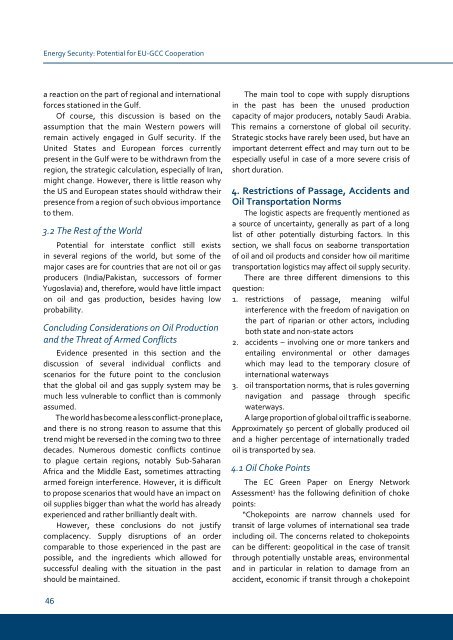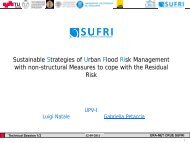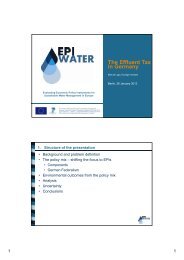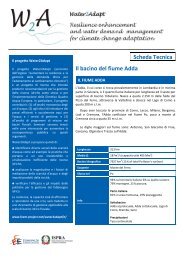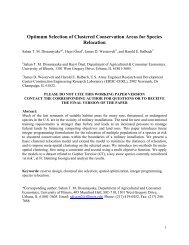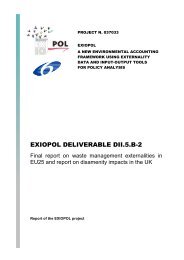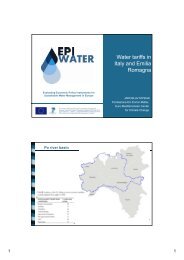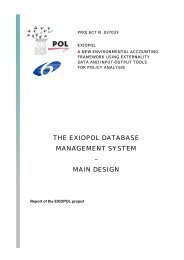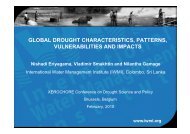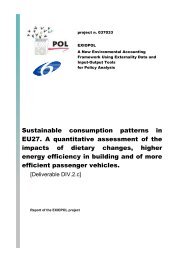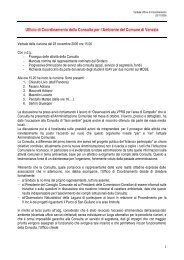Gulf and European Energy Supply Security - Feem-project.net
Gulf and European Energy Supply Security - Feem-project.net
Gulf and European Energy Supply Security - Feem-project.net
You also want an ePaper? Increase the reach of your titles
YUMPU automatically turns print PDFs into web optimized ePapers that Google loves.
<strong>Energy</strong> <strong>Security</strong>: Potential for EU-GCC Cooperation<br />
a reaction on the part of regional <strong>and</strong> international<br />
forces stationed in the <strong>Gulf</strong>.<br />
Of course, this discussion is based on the<br />
assumption that the main Western powers will<br />
remain actively engaged in <strong>Gulf</strong> security. If the<br />
United States <strong>and</strong> <strong>European</strong> forces currently<br />
present in the <strong>Gulf</strong> were to be withdrawn from the<br />
region, the strategic calculation, especially of Iran,<br />
might change. However, there is little reason why<br />
the US <strong>and</strong> <strong>European</strong> states should withdraw their<br />
presence from a region of such obvious importance<br />
to them.<br />
3.2 The Rest of the World<br />
Potential for interstate conflict still exists<br />
in several regions of the world, but some of the<br />
major cases are for countries that are not oil or gas<br />
producers (India/Pakistan, successors of former<br />
Yugoslavia) <strong>and</strong>, therefore, would have little impact<br />
on oil <strong>and</strong> gas production, besides having low<br />
probability.<br />
Concluding Considerations on Oil Production<br />
<strong>and</strong> the Threat of Armed Conflicts<br />
Evidence presented in this section <strong>and</strong> the<br />
discussion of several individual conflicts <strong>and</strong><br />
scenarios for the future point to the conclusion<br />
that the global oil <strong>and</strong> gas supply system may be<br />
much less vulnerable to conflict than is commonly<br />
assumed.<br />
The world has become a less conflict-prone place,<br />
<strong>and</strong> there is no strong reason to assume that this<br />
trend might be reversed in the coming two to three<br />
decades. Numerous domestic conflicts continue<br />
to plague certain regions, notably Sub-Saharan<br />
Africa <strong>and</strong> the Middle East, sometimes attracting<br />
armed foreign interference. However, it is difficult<br />
to propose scenarios that would have an impact on<br />
oil supplies bigger than what the world has already<br />
experienced <strong>and</strong> rather brilliantly dealt with.<br />
However, these conclusions do not justify<br />
complacency. <strong>Supply</strong> disruptions of an order<br />
comparable to those experienced in the past are<br />
possible, <strong>and</strong> the ingredients which allowed for<br />
successful dealing with the situation in the past<br />
should be maintained.<br />
4<br />
The main tool to cope with supply disruptions<br />
in the past has been the unused production<br />
capacity of major producers, notably Saudi Arabia.<br />
This remains a cornerstone of global oil security.<br />
Strategic stocks have rarely been used, but have an<br />
important deterrent effect <strong>and</strong> may turn out to be<br />
especially useful in case of a more severe crisis of<br />
short duration.<br />
4. Restrictions of Passage, Accidents <strong>and</strong><br />
oil transportation norms<br />
The logistic aspects are frequently mentioned as<br />
a source of uncertainty, generally as part of a long<br />
list of other potentially disturbing factors. In this<br />
section, we shall focus on seaborne transportation<br />
of oil <strong>and</strong> oil products <strong>and</strong> consider how oil maritime<br />
transportation logistics may affect oil supply security.<br />
There are three different dimensions to this<br />
question:<br />
1. restrictions of passage, meaning wilful<br />
2.<br />
interference with the freedom of navigation on<br />
the part of riparian or other actors, including<br />
both state <strong>and</strong> non-state actors<br />
accidents – involving one or more tankers <strong>and</strong><br />
entailing environmental or other damages<br />
which may lead to the temporary closure of<br />
international waterways<br />
3.<br />
oil transportation norms, that is rules governing<br />
navigation<br />
waterways.<br />
<strong>and</strong> passage through specific<br />
A large proportion of global oil traffic is seaborne.<br />
Approximately 50 percent of globally produced oil<br />
<strong>and</strong> a higher percentage of internationally traded<br />
oil is transported by sea.<br />
4.1 Oil Choke Points<br />
The EC Green Paper on <strong>Energy</strong> Network<br />
Assessment 3 has the following definition of choke<br />
points:<br />
“Chokepoints are narrow channels used for<br />
transit of large volumes of international sea trade<br />
including oil. The concerns related to chokepoints<br />
can be different: geopolitical in the case of transit<br />
through potentially unstable areas, environmental<br />
<strong>and</strong> in particular in relation to damage from an<br />
accident, economic if transit through a chokepoint


